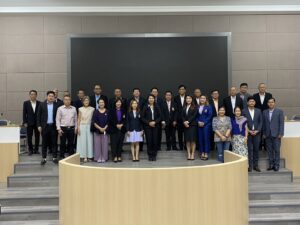[ad_1]

• Eight top federal universities retain no best student in three years
• Unmet vacancies of lecturers: UNILORIN 500, Gusau, 600; FUNAAB 350-plus
• Over 1000 vacancies in Ibadan; UNILAG, OAU, UNN and UNIBEN
Despite the exodus of university teachers and attendant shortage of manpower in public universities nationwide, the non-retention policy of the Federal Government has caused over 5,032 first-class graduates to languish in the job market and far away from the tertiary institutions that erstwhile retained them.
The Guardian estimates show that at least eight federal universities have produced over 5000 first-class in the last three academic sessions, but none of which has been retained in their alma mater.
It will be recalled that the Federal Government in 2020 placed an embargo on all recruitment into the civil service to maintain its workforce and stop the increase in the size of the nominal roll.
Embargoed with it too is the liberty of the university management to retain their best students and fill vacancies, especially in an era of global talent hunt and massive brain drain in developing countries.
Checks by The Guardian showed that about 500 academic vacancies exist at the University of Ilorin (UNILORIN), while the Academic Staff Union of Universities (ASUU) at the Federal University, Gusau, Zamfara, disclosed that the institution needed about 600 lecturers to fill the vacancies created by those who had left.
However, an analysis of UNILORIN and seven other federal universities showed that about 5,032 first-class graduates were produced in the last three sessions.
For instance, for the 2019-2020 academic session, the University of Lagos (UNILAG) had 281 first-class graduates. The University of Ibadan (UI) 241; the University of Ilorin (UNILORIN) 180; the Federal University of Technology, Akure (FUTA), 206; University of Nigeria, Nsukka (UNN) 174; Obafemi Awolowo University (OAU) Ile-Ife, 124; University of Benin (UNIBEN) 282; and Bayero University, Kano (BUK) 105.
For the 2020-2021 session, UNILAG 238; UI 265; UNILORIN 178; FUTA 195; UNN 246; and BUK 285, while for the 2021-2022 academic session, UNILAG had 158; UI 314; UNILORIN 239; FUTA 195; UNN 288; OAU 158; and UNIBEN 179.
Graduates of first-class degrees are at the top of their class, with an average of 70 per cent or more overall. They are viewed as potential scholars and often expected to pursue further academic studies. However, many of them are denied the opportunity to work in the institutions that produced them.
The unions disclosed that at the Federal University of Agriculture, Abeokuta (FUNAAB), Ogun State, over 350 academic vacancies were available, while about 1,000 or more are needed at the University of Ibadan; UNILAG, OAU, UNN and UNIBEN.
ASUU disclosed that at the Usmanu Danfodiyo University, Sokoto, about 50 lecturers had left the university, while the Chairman, UNIBEN chapter, Dr Ray Chikogu, also confirmed a shortage of staff in the institution, as well as other institutions.
Although there is no existing government policy specifying that first-class graduates should be retained, however, some institutions, over the years, traditionally retained some of these best brains.
For instance, the immediate past vice-chancellor of UNILAG, Prof. Oluwatoyin Ogundipe, said the institution employed about 100 graduates of the university, who made first class in their various fields of studies.
He said the employment gesture was aimed at retaining some of the best brains to take the university to its desired goal.
An official at the University of Ibadan, who pleaded anonymity also confirmed that the institution, used to retain its best students as Graduate Assistants, but had to stop due to lack of funds.
The situation is the same in UNILAG, UNIBEN and OAU, as university administrators admitted that they no longer retain this set of students due to inadequate funding.
Worried by the growing number of unemployed first-class graduates, the House of Representatives, last year, urged the Ministry of Education to liaise with relevant government agencies to ensure their engagement.
Although there are concerns about the quality of first-class graduates presently being produced by the institutions and whether they are ‘fit’ to be injected into the tertiary education system, stakeholders argued that there is an increasing number of serious-minded students who deploy information communication technology (ICT) to achieve excellent results.
Besides, they noted that there is improvement in learning systems, which are becoming more learner-focused than teacher-centred; giving room for conscientious students to explore and research widely on their own.
They argued that “first-class graduates of any Nigerian university are people who have outstanding achievement, very intelligent, very clever, much focused and the type needed to run the nation’s universities.”
But the vice-chancellor of Obafemi Awolowo University, Prof. Adebayo Bamire, said public universities can no longer retain the services of their best students after graduation because they lack the power to do so.
“Before you can recruit anyone into any department, your papers have to go through seven agencies of government. It is not like you just pick anybody on the street and bring the person in because it has implications on your budget,” he said.
A professor of Adult Education, at Olabisi Onabanjo University (OOU), Ago Iwoye, Adesoji Adenugba, said the retention of the best brains would solve the manpower challenges in the universities.
He noted that first-class graduates were trained in the enterprise of knowledge and would help the system grow better.
“If you retain the best of graduates, it means that year in and out, you will have at least one or two graduates of every department and the issue of excess load will no longer arise. Don’t forget, earned academic allowances have been one of the basic issues cited by the ASUU virtually in all the strikes they had over the years,” he said.
Dean of Post Graduate Studies, University of Uyo, Prof. Monday Effiong, while appealing to the Federal Government to reconsider its stance and lift the embargo on employment, noted that first-class graduates should be encouraged to stay back and contribute their quota to the development of university education.
“Not offering jobs to first-class graduates is not necessarily a policy of the universities,” Effiong said, pointing out that government’s restriction on employment, regardless of grade is why many first-class graduates are unable to gain employment in the tertiary education system.
“It will take a rigorous process for a university to employ one first-class graduate. There are so many things you have to do to employ just one person,” Effiong added.
The Pro-Chancellor and Dean of the College of Business, Law and Social Sciences at the University of Derby, United Kingdom, Prof. Kamil Omoteso, recalled that during his time at the University of Lagos, students who graduated with first-class were retained and offered jobs as Graduate Assistants, and they would use the opportunity to build on their profile and determine whether or not to stay in academia.
He called on the government and university administrators to be serious about the employability of their students, noting that they are talents that should not be wasting away.
An official of ASUU at the Nnamdi Azikwe University, Awka, Rowland Udom, said the shortage of staff across the universities had been a problem due to the embargo on employment by the Federal Government.
Udom said the government’s action constituted undue interference in the running of the universities, especially concerning the recruitment and promotion of staff.
He said the Federal Government’s interference in the internal affairs of the institutions should have been handled by universities’ Senates and Councils.




